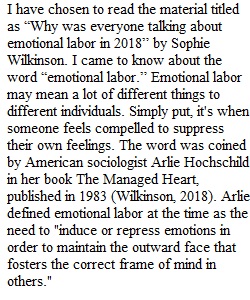


Q This assignment was locked Mar 16 at 8:59pm. Submission Options: o Written assignment or o 1-3 Google or PowerPoint slides. (Note: If you choose slides, you must save your completed work as a PDF and upload it that way or I won't be able to view it.) Resources to use: Choose at least one of these resources to read or listen to: Women Are Just Better at This Stuff (Links to an external site.) Why Was Everyone Talking About Emotional Labor in 2018? (Links to an external site.) Why Women, but Not Men, Are Judged for a Messy House (Links to an external site.) Why LGBTQ Couples Split Household Tasks More Equally (Links to an external site.) N.Y. Times Explores How Same-Sex Couples Split Up Housework (Links to an external site.) Women Aren't Nags—We're Just Fed Up (Links to an external site.) From WBUR Dear Sugars podcast Questions to answer: Copy/paste these bullets into your assignment and then answer each one separately. o What did you learn from the material you chose to read/listen to? o In your experience, are women still expected to do most of the housework? o In your experience, are women accepted/treated differently in their workplaces than men? o Reflect on your own upbringing, who did the household chores, childcare, and emotional labor that kept the family enterprise running? Was it shared equally? o Optional: Ask at least one question that you are left with. Checklist for full points: Make sure your submission checks off each of these boxes in order to receive full credit. o Did you copy/paste each bullet into your assignment and then answer each one separately? o Did you use in-text citations to cite your quotes? o Is your analysis at least 250 words long? That means do not include the questions/bullet-points you copied/pasted in your word count. Do not include quotes copied from the reading. And do not include the optional question if you asked one. 250 words is the minimum for your original writing and analysis (no maximum). o Is what you're submitting college-level writing including, but not limited to correct spelling, capitalization, grammar, usage, citations, etc.? (In other words, please remember that the writing skills you honed in English VO1A apply to the work you're submitting in this class too.) How Assignments Are Graded: Submissions that answer each prompt posed and check off every box on the checklist above will be marked "complete" and receive full credit. Answers that skip one or more prompts and/or do not check off every box on the checklist above will be marked "incomplete" and will receive 1/10 points. If nothing is submitted, a zero will be entered in the grade book to indicate "missing". Rubric Contract Grading Assignment Rubric (10 points) (1) Contract Grading Assignment Rubric (10 points) (1) Criteria Ratings Pts This criterion is linked to a Learning OutcomeDoes your submission meet all of the criteria listed for this assignment? 10 pts Complete Your submission did everything this assignment asked for. Thank you for the time & effort you put into writing this. 1 pts Incomplete Your submission did not do everything this assignment asked for. Go back over the assignment directions and compare what you submitted to what the directions asked for. If you're still confused by what you're missing, just email me. 0 pts Missing You didn't submit anything for this assignment. 10 pts Total Points: 10 PreviousNext Running head: WOMEN’S WORK ASSIGNMENT
View Related Questions